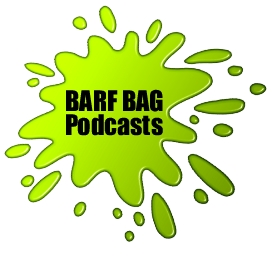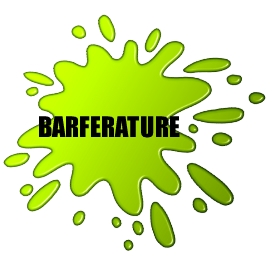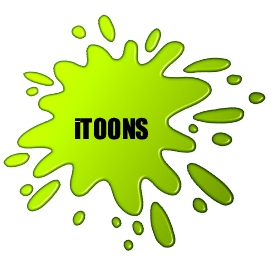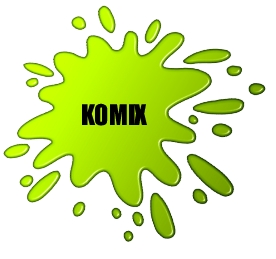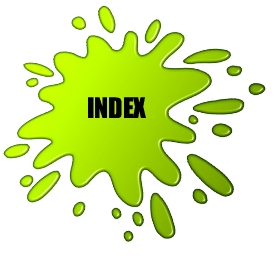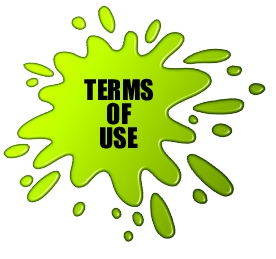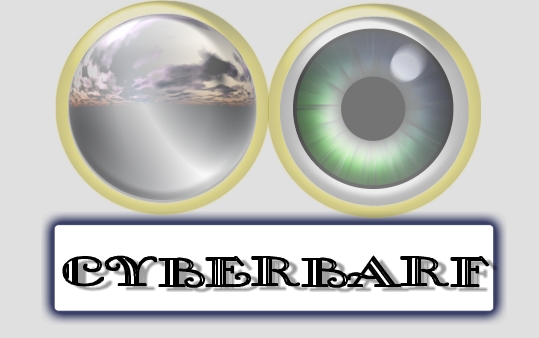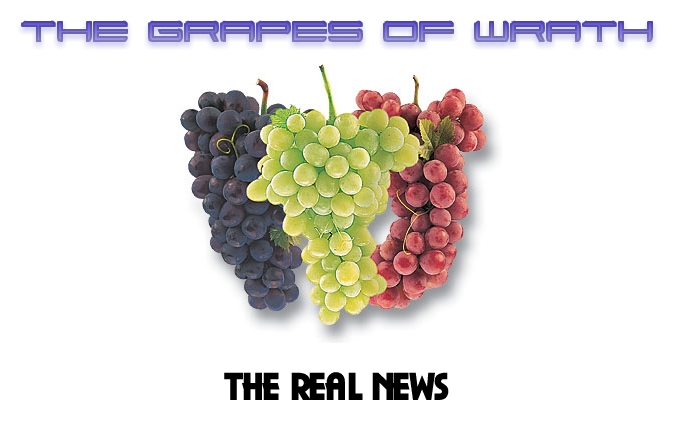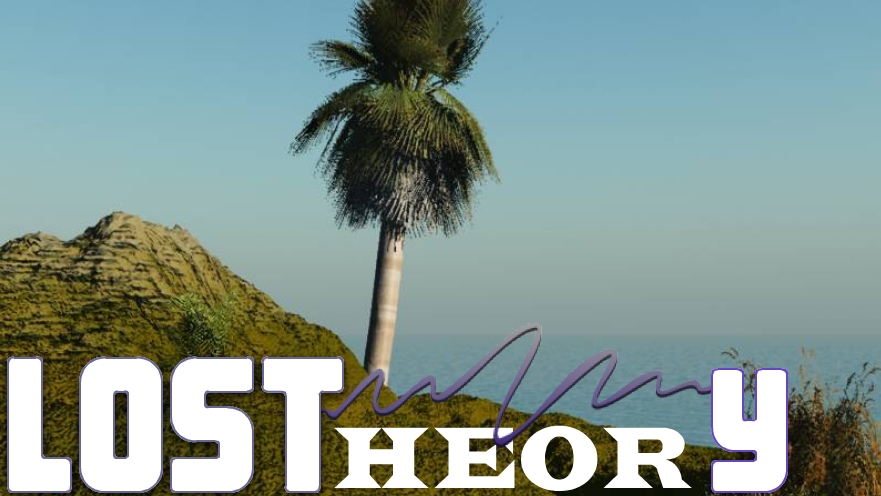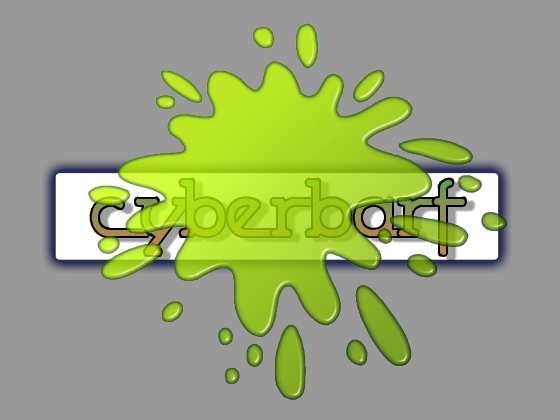|
THE DARK
|
 |
“The Dark comes from the Anglo-Saxon word for gloomy, cheerless, or sinister. When several web sites went Dark in protest last month over a new Internet regulation bill pending in Congress, all those word elements came into play. The gloom fell upon those who had to go without access to their favorite sites. Cheerless were those in the industries affected by the far reaching powers of the bills. Protesters feared the sinister nature of the government controlling the last bastion of freedom: the world wide net.” |
| “The
Internet is filled with enough Darkness of stalkers, cyber-criminals and scam artists to add new government threats of censorship, property forfeiture without a hearing, criminal and civil penalties for non-self-policing billions of bytes of daily information against web servers and site owners. The web blackout protests made the news. The question remains whether it will have a lasting effect against regulation of the Internet.” |
 |
|
“This issue will examine some of the conflicts and concerns of the U.S. House bill, Stop Online Piracy Act (SOPA) and the Senate version, the Protect IP (Intellectual Property) Act (PIPA).” cyberbarf EXAMINE THE NET WAY OF LIFE |
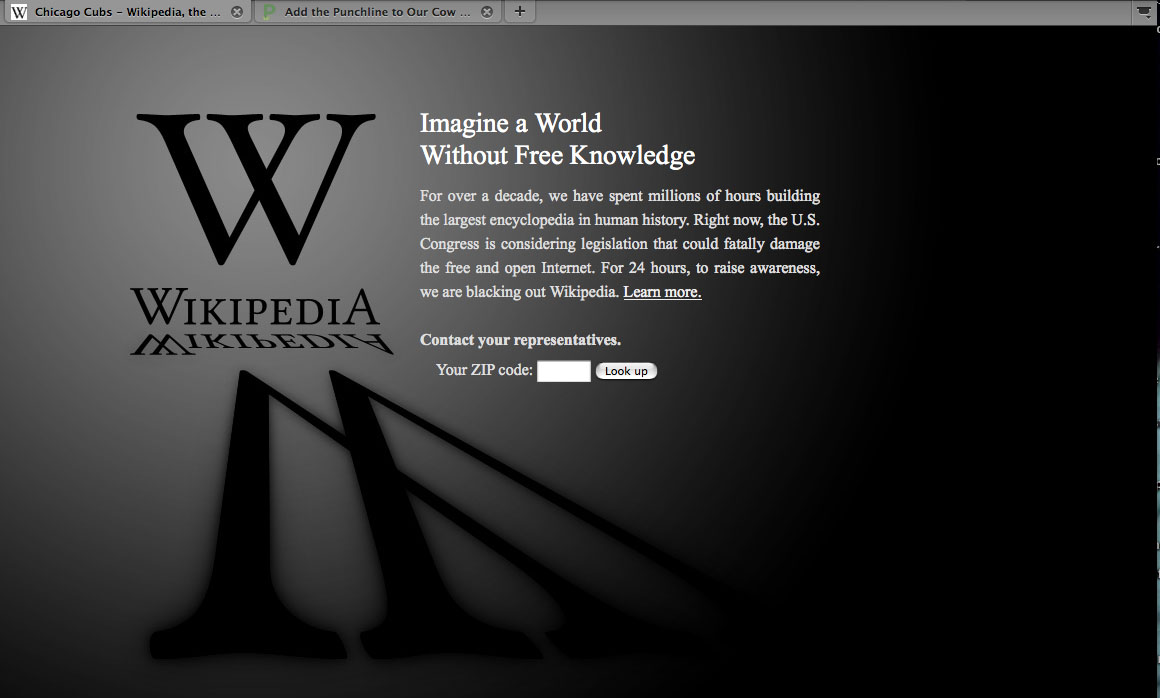 |
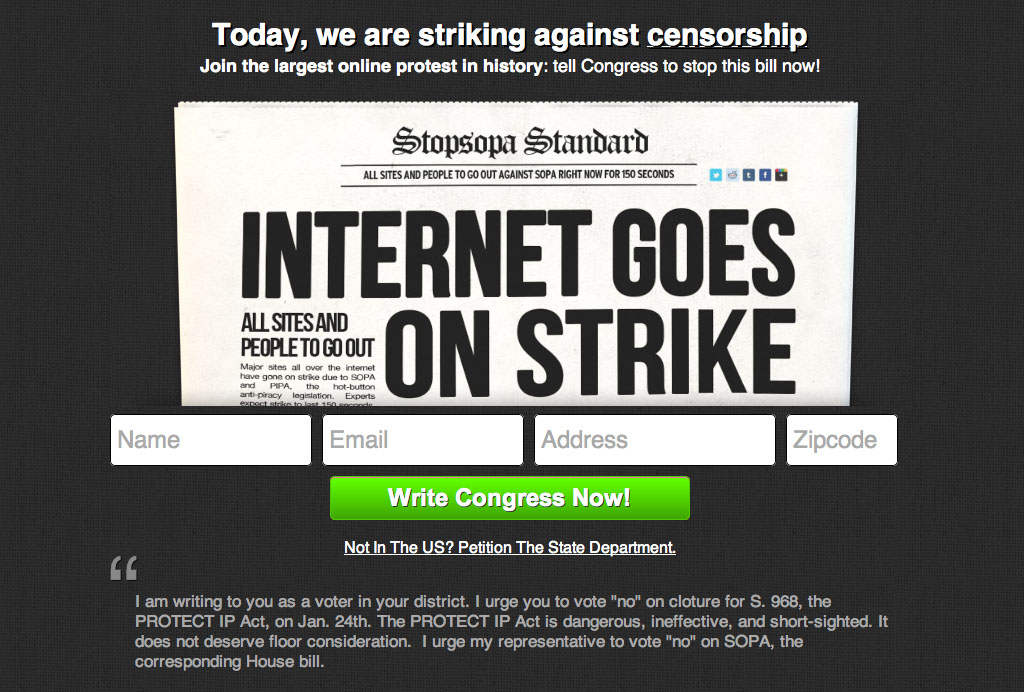 |
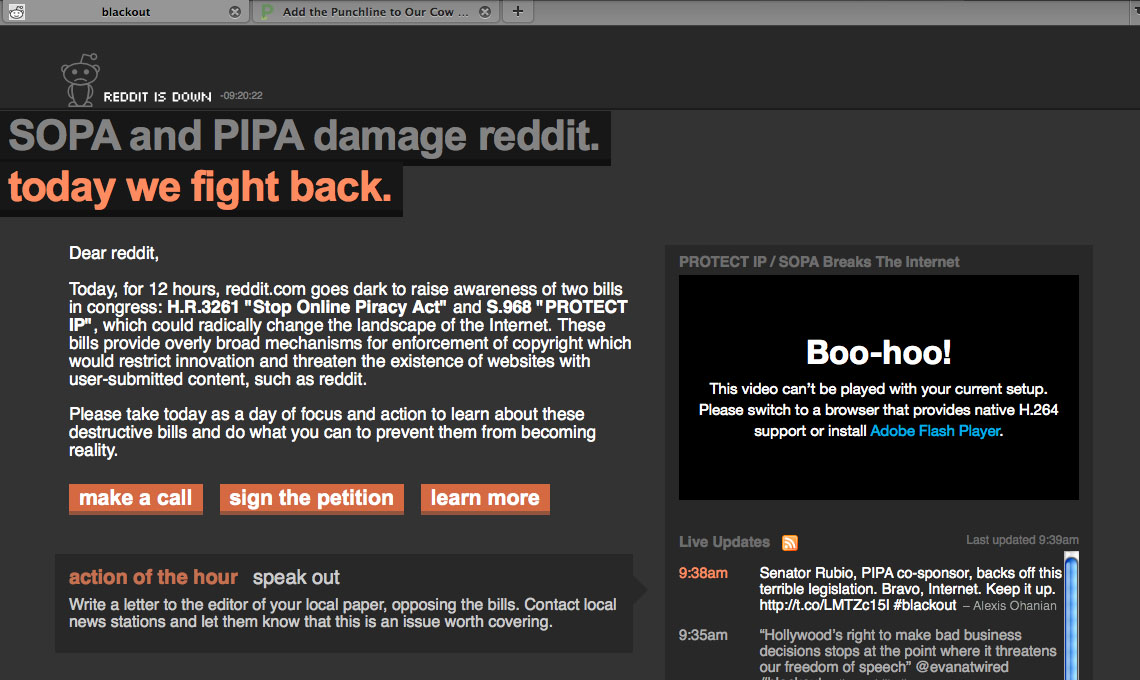 |
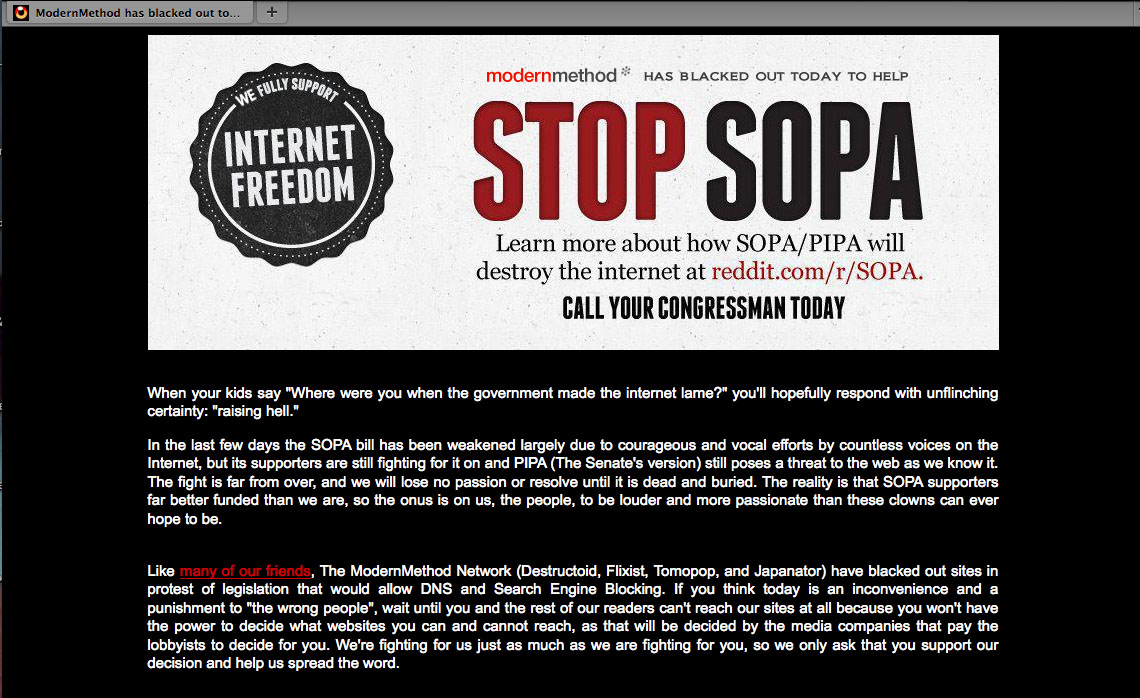 |
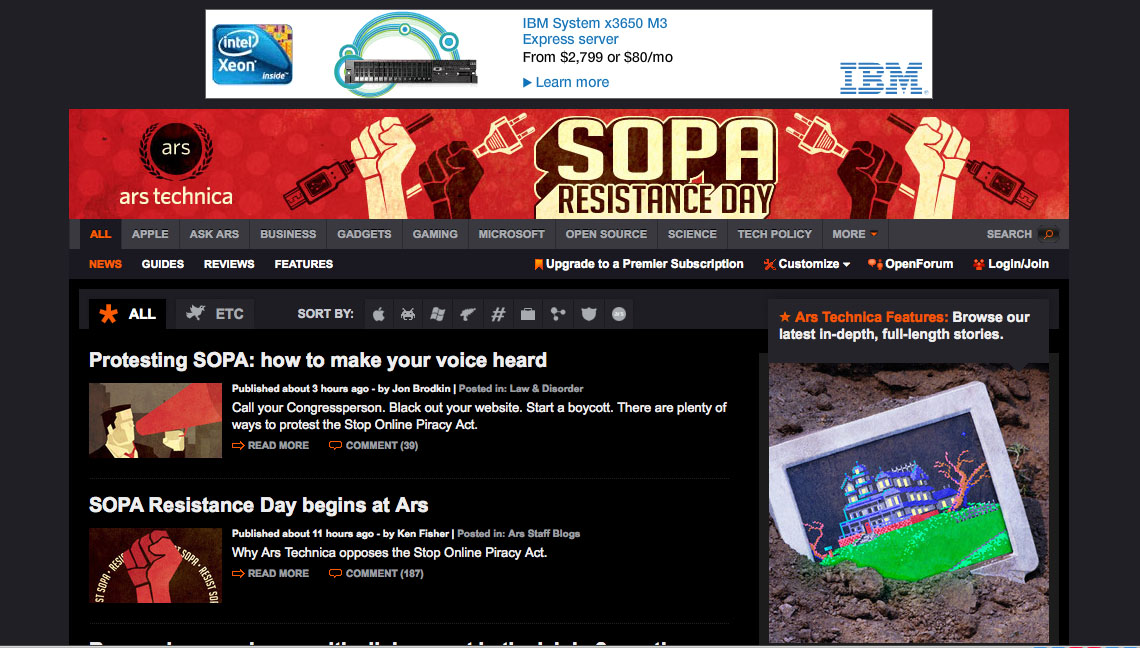 |
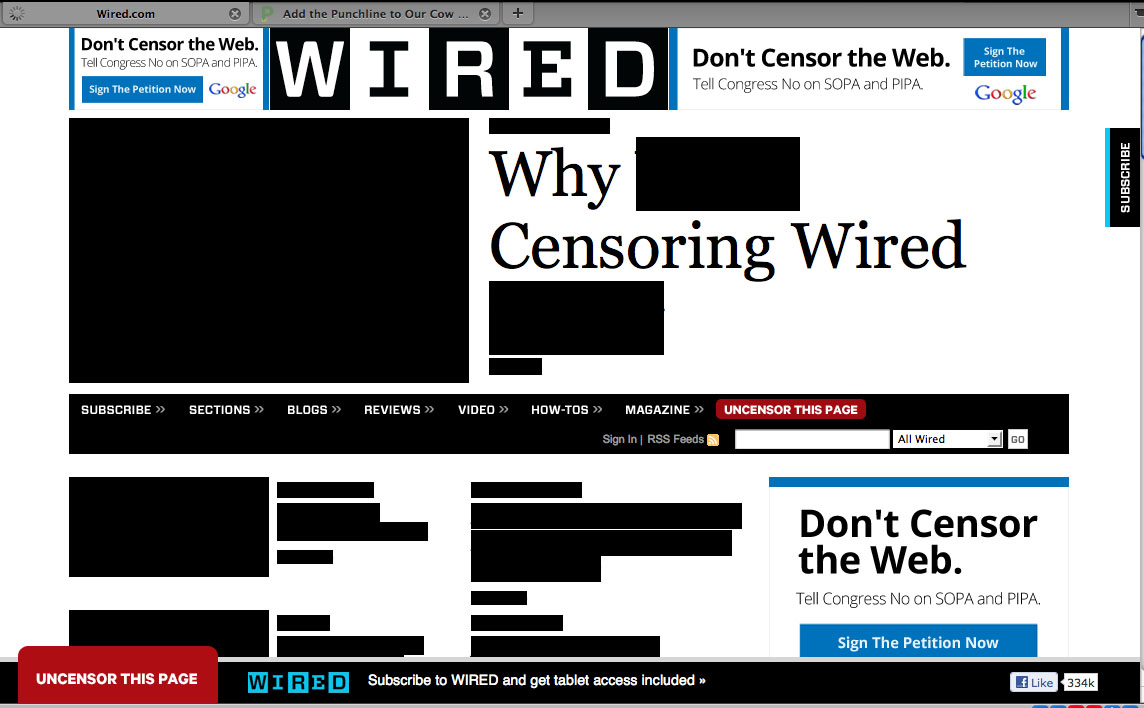 |
|
|
EXAMINE THE NET WAY OF LIFE FEBRUARY, 2012
IN THIS ISSUE: WHAT THE MESS IS ALL ABOUT THE MEANING OF (NET) LIFE INDIAN GIVERS WHETHER REPORT THANK YOUR FOR YOUR CONTINUED SUPPORT. CYBERBARF |
|
cyberbarf WHAT THE MESS IS ALL ABOUT ARTICLE The Dark Ages were the times when innovation and knowledge was lost by a great plague of self-preservation against pestilence, disease and fear. Ancient knowledge and the means of communication were lost until the rebirth in the Renaissance. The content providers and web infrastructure businesses believe that they are the means of knowledge and communication in the age of the digital Renaissance. But they fear a horizon akin to the Dark Ages if government regulation of the net comes true if Congress passes the Stop Online Piracy Act (SOPA) and the Protect Intellectual Property Act (PIPA). As the Borg in Star Trek were want to say, “Resistance is futile.” Whether the internet strike protests by sites like Wikipedia or Reddit will have any lasting impact on the legislative agendas fueled by special interests is up for debate. Some form of Change is coming on the horizon. The originally proposed SOPA bill would allow the US Department of Justice, as well as copyright holders, to seek court orders against websites outside US jurisdiction accused of enabling or facilitating copyright infringement. A court order requested by the DOJ could include barring online advertising networks and payment facilitators from conducting business with websites found to infringe on federal criminal intellectual-property laws, barring search engines from linking to such sites, and requiring Internet service providers to block access to such sites. The law requires online service providers, Internet search engines, payment network providers, and Internet advertising services, upon receiving a copy of a court order relating to an AG action, to carry out certain preventative measures including withholding services from an infringing site or preventing users located in the United States from accessing the infringing site. It also requires payment network providers and Internet advertising services, upon receiving a copy of such an order relating to a right holder's action, to carry out similar preventative measures. The bill establishes a two-step process for intellectual property-rights holders to seek relief if they have been harmed by a site dedicated to infringement. The rights holder must first notify, in writing, related payment facilitators and ad networks of the identity of the website, who, in turn, must then forward that notification and suspend services to that identified website, unless that site provides a counter notification explaining how it is not in violation. The rights holder can then sue for limited injunctive relief against the site operator, if such a counter notification is provided, or if the payment or advertising services fail to suspend service in the absence of a counter notification. The second section covers penalties for streaming video and for selling counterfeit drugs, military materials or consumer goods. The bill would increase penalties and expand copyright offenses to include unauthorized streaming of copyrighted content and other intellectual property offenses. The bill would criminalize unauthorized streaming of copyrighted content, with a maximum penalty of five years in prison for ten such infringements within six months. The bill provides immunity from liability to the ad and payment networks that comply with this Act or that take voluntary action to cut ties to such sites. Any copyright holder who knowingly misrepresents that a website is dedicated to infringement would be liable for damages. Supporters of the bill include the Motion Picture Association of America, pharmaceuticals makers, media businesses and the US Chamber of Commerce. They say it protects the intellectual-property market and corresponding industry, jobs and revenue, and is necessary to bolster enforcement of copyright laws, especially against foreign websites. However, some opponents believe that it empowers the government to enforce private property rights, including take down and seizure of web sites and property, without due process, all for the benefit of private owners of copyrighted materials. Internet hosting services and search engine companies believe the amended law would still put them in court for aiding alleged copyright infringement on their systems, something that giants like Google or Yahoo could not police or retract users uploads. Authors and journalists fear that the bill would lessen free speech because it does not adequately preserve fair use and other copyright defenses from unilateral damage claims and seizures. Even though it was drafted to allegedly stop foreign web sites from copyright violations, the scope of the Internet is global so the application of foreign servers routed through US systems puts US systems and users under the law. Opponents believe the law is written to find anyone using the Internet “guilty until proven innocent.” cyberbarf MURMUR:LOST SOULS REAL NEWS KOMIX We continue our new graphic novella with Part Two.
cyberbarf THE MEANING OF THE (NET) LIFE ESSAY It is part of a daily routine like the morning digestion of caffeine. For some, it is on par with breathing air. Several major retailers, like Amazon, cannot survive without it. The Internet. The new commercial blood of the body of the world economy. It is so routine for most people that they do not miss it unless their cable or DSL line goes out. We are all tethered like obese blimps to our wired information. The global network of computers has become the new communication utility as simple to use as dialing a telephone or turning on the television set or breathing oxygen. People look to their computer screens for their news, information, entertainment, business and personal communications. Your Internet access device has become as valuable as one's own hand. Lop it off, and you will emotionally bleed to death. No one could have imagined the progress and interconnectivity the web network has brought when it was in its infancy twenty-odd years ago. It was the personal realm of university geeks playing around with the old telecom grid. Now, everyone has the more power than a vintage supercomputer in the palms of their hands. Engineers, garage entrepreneurs and visionaries created hundreds of new business enterprises that built the Second American Industrial Revolution, the personal computer information wealth machine. The revolution may have some government grant research roots, but the explosion of tools for the masses was jump started by new communication protocols, easy non-program iconic communication sets, and the imagination of early adopters to new technology. In the primordial ooze of the electronic frontier, there was no regulation, no taxation, no bureaucratic interference - - - it was pure hit and miss invention. Just as the American West was settled through gold rushes to the West Coast, the digital gold rush put people and businesses into cyberland without thinking long term. It was like the railroad boom in the 1800s: everyone could sell shares and lay down rails on the dirt and call themselves a railroad. An investment cycle of boom then bust cratered the railroads when they were overbuilt then underused, collapsed by debt. Every promoter, from web servers to web designers, pushed everyone to stake their claim to a piece of the Internet space. Domains, web pages, email accounts, web advertising, and most important - - - interactive content. With key demographics for old media conglomerates moving to the near unlimited pages of stuff on the Internet, media companies rushed their content (news, information, television shows, photographs, comics and features) onto the net. But the net users were already used to free content, and their hunger was fed by every content maker. And once it became part of the net culture that the Internet was free, it got convoluted to mean that everything on the net was free (to use, to share, to copy, to forward) including copyrighted materials. By the time media companies thought about putting up pay walls, it was too late. Their materials were already out in the networks and people were using them at will. If materials were not voluntarily posted on the web, individuals would scan or copy of the materials and place them up for anyone to get access. It did not matter whether these posts were non-commercial; copyright owners were furious. Only copyright owners can license or give others permission to make and distribute copies of their works. But the horses have left the barn, and the barn had burned to the ground years ago. The freedom of the Internet is the same as the lawlessness of the Old West. And without the physical presence, the digital badlands is difficult to impossible to tame. But the landed gentry want a new sheriff in town to protect their interests over the desires of anyone else. But the music and movie studios had lobbyists and campaign cash to toss around. First, the Digital Millennium Copyright Act brought in procedural rules that created take-down notices on web service providers, like YouTube, which required operators to block or takedown the copyright infringing use of the owner's intellectual property. The DMCA seemed to put a balance between individuals uploading their own content, web servers creating a notice policy, and copyright owners (who have the responsibility to police their property for infringement). This legislation acknowledged that web servers and web operators who allow third parties to post on their systems would not be liable for those infringing uploads. Second, circuit courts have allowed copyright owners subpoena power of web operators to find the addresses and identification of any copyright infringers. The Copyright Act has always had severe statutory penalties for violations. As some illegal music swappers have found out, damage judgments can be in the hundreds of thousands of dollars. So, copyright holders had enough laws on their side to effectively police their intellectual property. The web is a global beast. It is like Godzilla mated with the Blob to create a global ocean of uncontrollable electric Slop. Much of the infringement occurs outside the jurisdiction of the United States. So American studios continue to be miffed by the breath and scope of the worldwide network that it cannot police every upload, download, or page view to see if someone, somewhere, is making an illegal copy of the property. The studios believe that this is an impossible burden upon them. So they want to shift that burden onto others. SOPA and PIPA are attempts to shift the policing of copyrights from the holders to the Internet web masters. For example, any organization that allows uploads to their servers would be responsible for all that content, information and links. For example, Wikipedia would have to review every single post, link, comment and photograph entry on any of its encyclopedia pages. That is an impossible task for Wikipedia managers. They basically said that if the laws were implemented, Wikipedia would have to shut down. No more net encyclopedia. It would also impact the web host firms, who would also be responsible for the web pages and content of their customers. Web servers are in the business of hosting clients. Not policing for alleged infringing content. Many web hosts would pull their own plug and go out of business. Also, web page operators, such as special interest publications, would close shop for fear that any commentator, blogger or freelancer who imbeds a hyperlink to copyrighted content, could be vicariously liable whether or not the operator knew the link was accessible from their pages. To enforce the proposed laws, the Internet would go dark like every power plant in America being shut down by Congressional fiat. The law of intended consequences would be to cripple the free flow of information on the Internet Maybe that is what the music industry and movie studios want - - - kill the beast that is the thorn in their collective revenue sides. How would that effect you? Considering most people spend at least four hours in front of their computer screens at work using web pages to conduct business, research, emails, advertise, market goods and services, and to get news, alerts, weather, investment and banking transactions, it would be a global information collapse that would make the 2008 financial collapse look like a child's sand castle falling a part under the foam of the beach surf. It would be like allowing you to buy a car, but it cannot have an engine. Or that if you had a car with an engine, you could not drive it out of your home driveway onto the public streets. Yes, it would appear crazy to cripple a multi-billion dollar communications network. But it is not a matter of preserving the public good. There are two forces at work: the copyright holders who want harsher penalties and penal procedures to force people to come to them to buy news, information, entertainment; and the federal government whose officials have been salivating for a way, a reason, to regulate (then later tax) the entire Internet Once the government can regulate one aspect of the Internet, it can regulate all aspects of the Internet, which can include content, access and licensure. If you think a country cannot regulate the net, just look at China. It blocks undesirable sites from its citizens. It is not hard to do. Its national servers can block any URL or IP address from its home network infrastructure. Look at the Arab spring uprising in Libya and Syria. Those dictatorship governments sought to block cell phone and web connections in order to keep control of the masses in the dark. It is not hard for conspiracy theorists to believe that the United States could do the same. Political motivations to suppress free speech to keep incumbents and cronies in power is the same as the Chinese leadership suppressing political opponents or Western sites that are critical to the New China capitalistic, communist culture. Information is the new global economic commodity that in time may eclipse manufacturing tangible products as the top tier of valued civilization items. Ancient cultures worshipped jackal faced humans, the Earth's elements and the Sun; soon, the pimple faced born with a mobile device as a pacifier generation will worship data as its own gold. Major Internet search engines and retailers realize this by the constant data mining customer information for targeted ads or resale to marketing firms. Your personal information is the veins of gold that some people want to mine for their own profitable purposes, including public officials.
cyberbarf INDIAN GIVERS ESSAY There was an old American West saying about the natives propensity to take back trade objects called “Indian giving.” It is possible that it was caused by a clear lack of understanding of the native culture. It also could have been spiked by envy or revenge. In most Indian cultures, they believed that they did not own the land, the water, the animals or anything else as a product of nature. The gods and spirits were the creators and providers to them. When Europeans came in contact with their settlements, the new inhabitants brought in the foreign notion of property ownership. The trade or barter for goods was well known to both peoples. But in the Indian tribe, more likely than not, all items belonged to the tribe and not the individual. So if an individual was given an item to use, it could be taken back. The new Americans used the phrase as a derogatory term to undermine the Indians. But the greatest practitioner of this property seizure was the Americans themselves, who continually displaced the Indians off their native lands until they were rounded up into permanent reservations. There was a recent example of this in modern American jurisprudence. The case recently decided by the US Supreme Court is Golan v. Holder, and it deals with copyrights. The US Constitution granted Congress the power to create copyrights. The laws of the United States would control ownership, use and distribution of creative works within the United States. But a series of international treaties put the US on its own copyright protection island in regard to international works (non-domestic registrations). Plaintiffs were orchestra conductors, musicians, publishers and others who enjoyed free access to works that were in the public domain by virtue of past US failure to recognize the foreign works by meeting US legal formalities. A creator's work in their home country did not receive automatic protection in the United States. In 1886, the Berne Convention treaty stated that signatory nations would provide a minimum protection for copyrighted works and treat authors from foreign nations the same way they did domestic creators. The US required foreign authors to publish in the United States in order to get protection, even when the US joined the Berne Convention in 1989. Under threat of sanctions by the World Trade Organization, Congress began to implement the Uruguay Agreements to grant copyright protection to works as they were protected in their country of origin. The effect of this action was to retroactively give foreign works US copyright protection, even for works long in the “public domain” and freely used by musicians, orchestras, schools and theaters productions. The Supreme Court ruled against the Plaintiffs. The Court concluded that the Copyright Clause contained no time limitations or restrictions on what Congress could do in framing copyrights. Congress can implement whatever limitations it wants on copyrights, including perpetual rights for works. The Court found that restoration of copyrights and patents had happened before, under the first Copyright Act of 1790 which protected works that had been previously in the public domain under state laws. Since Congress has full authority in this area of the law, it could effectively take back works in the public domain and restore infringement and licensing requirements for the benefit of the original authors or copyright holders. The Court rejected Plaintiffs First Amendment arguments that they acquired a vested right to use the works once they were in the public domain. The Court said the law did not expand traditional copyright concepts of protecting the actual work versus an expanded protection of mere ideas or concepts. The law also did not diminish fair use defenses. The Court concluded that Congress implementing foreign treaties had merely placed foreign works in the same position they would have occupied if the current copyright regime had been in effect when those works were created and first published abroad. The case is an affirmation of the unlimited power conferred to Congress on the issue of copyrights and copyright protection. The open question is how far Congress is willing to push this authority under the claim of “copyright protection laws.” It would not be difficult to hear in the near future that Congress, the FCC or the FTC or a copyright czar will need to “regulate” the Internet in order to provide a remedy against copyright infringement. That possible new regulatory scheme of the Internet is part of what the fear is by web site operators and host providers to protest SOPA/PIPA.
|
|
THE PINDERMEDIA STORE IS FULL OF FUN TEE-SHIRTS AND SELECTIONS. FUN . . . . VALUE . . .. FUN . . . . VALUE! GO FOR IT!
SUPPORT cyberbarf VISIT THE CYBERBARF STORE! Prices may vary depending on sales, allotments, inventory. |
|
cyberbarf THE WHETHER REPORT |
cyberbarf STATUS |
| Question: Whether the Internet protest black outs of sites against government regulation will stop the regulations from being implemented in some form in the future? |
* Educated Guess * Possible * Probable * Beyond a Reasonable Doubt * Doubtful * Vapor Dream |
| Question: Whether the Apple's iPad and new electronic textbook will quickly win over cash strapped school districts? |
* Educated Guess * Possible * Probable * Beyond a Reasonable Doubt * Doubtful * Vapor Dream |
| Question: Whether English composition, grammar and long form writing will continue to decrease with more children getting touch pads at younger ages? |
* Educated Guess * Possible * Probable * Beyond a Reasonable Doubt * Doubtful * Vapor Dream |
|
cyberbarf EXAMINE THE NET WAY OF LIFE |
Freedom's just another word for nothing left to lose. Kris Kristofferson |
|
cyberbarf
THE STEAM PUNK SPECIAL EDITION featured new Music from Chicago Ski & the (audio) Real News: (mp3/4:14 length)
EXAMINING THE NET WAY OF LIFE cyberbarf™ distributed by pindermedia.com, inc. |
|
FEATURING: THE REAL NEWS IMPACT EDITORIAL CARTOONS WRIGLEYVILLE WAR POLITICS ENDORPHIN RUSH THE DARK ABYSS RANDOM ELECTRONS SPECIALS
FEATURING: THE REAL NEWS ARCHIVES CARTOONS MADAME'S TEA HOUSE THE BAR EXPLORE THE CITY SCAPE UNDER CONSTRUCTION SURPRISES ESTORE SPECIALS
|
REWIND
LOST
AFTER
A
FULL YEAR
ON
LOSTHEORY
cyberbarf
Distribution ©2001-2012 pindermedia.com, inc.
All Ski graphics, designs, cartoons and images copyrighted.
All Rights Reserved Worldwide.
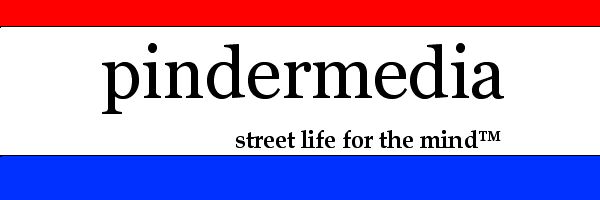
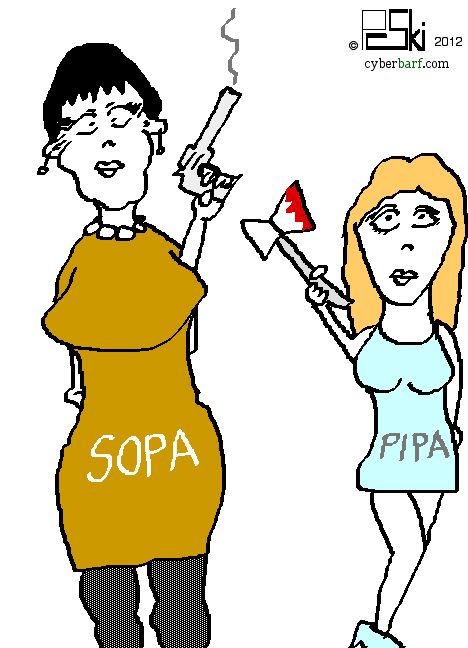
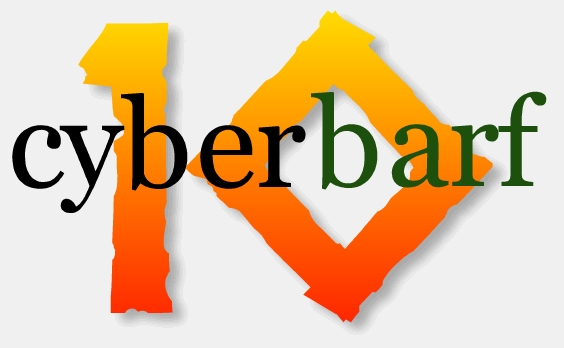 ,
,


